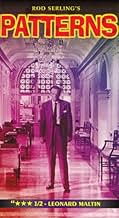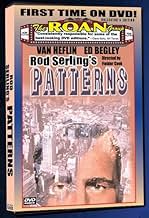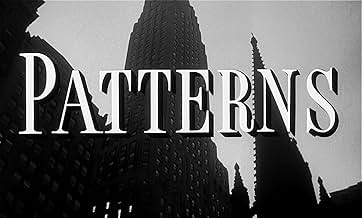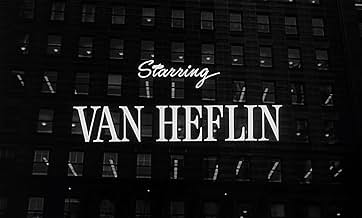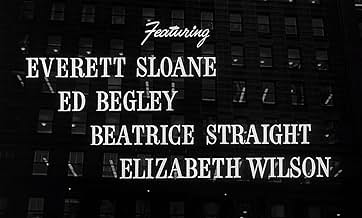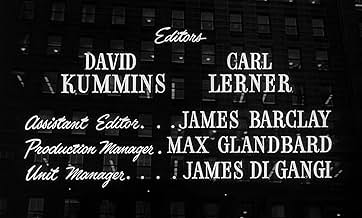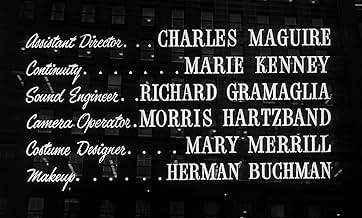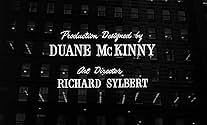When Fred Staples is recruited onto the board of a high-powered New York corporation, he finds his ethics and ambition at odds.When Fred Staples is recruited onto the board of a high-powered New York corporation, he finds his ethics and ambition at odds.When Fred Staples is recruited onto the board of a high-powered New York corporation, he finds his ethics and ambition at odds.
- Nominated for 1 BAFTA Award
- 1 nomination total
- D.J. Vandeventer
- (as Jack Livesy)
Featured reviews
Ramsey knows no one likes him, but he couldn't care less. He'd rather play to win than play nice. He knows that it's time for nice old boy Bill Briggs (Ed Begley) to go and he's found just the man to take his place in Staples, who'd been managing his plant in Ohio. The only problem is that Staples genuinely likes Briggs and detests Ramsey.
You'll hate Walter Ramsey too, but you'll see that he built his company not merely through intimidation but by being an excellent judge of character. He recognizes that Staples, who seems clueless when it comes to office politics, is immensely talented and actually very ambitious. Ramsey sees that the fact Staples will never like him is really an asset. He doesn't want a groveling yes-man, he needs someone who will fight him.
Of course Briggs also fights with Ramsey, but his punches never land. His arguments are easily brushed aside and only serve to make Ramsey even angrier. Briggs refuses to accept that he's washed up, which reflects either his stubborn nature or his lack of professional vision. In any case, it's a fatal flaw and Ramsey mercilessly carves him up.
This is painful to watch and all your sympathy is with Briggs, but from a business perspective you have to accept that Ramsey is right. Gradually, Staples sees this as well and that Ramsey understands him better than he understands himself. At the end, Fred Staples hates Walter Ramsey more than ever but he can't resist his boss' challenge. And Ramsey knows that though the price was high, he finally has the man he wants as his vice president.
"Patterns" offers many solid performances, especially Sloane's and Heflin's. Ed Begley is hardly my image of a corporate executive (he was much more credible as the cop turned crook in "Odds Against Tomorrow"), but he certainly looks the part of a sick man. Watching Beatrice Straight I couldn't help but recall her role in "Network" and wonder if her Nancy Staples would suffer the same fate in the 1970s. Straight had a rare combination of intelligence and beauty, and it's a shame she made so few films.
"Patterns" is quick (about 85 minutes) because it has to be. Were it any longer Ramsey's bullying of Briggs would be unbearable and the film's real point would be lost.
Today we flatter ourselves when we think that characters like Ramsey went out with the Edsel. It's a different world, but it's still a cruel one. Working women are no longer called "girls" and some may have moved into executive suites, but the corporation imperatives are the same as they were in 1956: know your people, know your product, make money, cut your losses.
None of this was lost on Walter Ramsey. We may hate him, but as much as we hate to admit it, we still need him. That's not the way we like it but that's the way it is.
Heflin plays a young man named Fred Staples, a small-town manager who is brought into a large firm by the President, Ramsey (Sloane). It's apparent to the viewer (and everyone but Staples) that he's been hired to replace one of the vice presidents, Bill Briggs (Begley). Staples admires Briggs and the humanity that he brings to his job, but he's the last of the old firm back when it was run by Ramsey's father, a compassionate man who cared about the workers. This Ramsey only cares about dollars and cents and efficiency. He's determined to force Briggs out.
Back in the '50s, big business movies were all the range, with films like "Women's World" and "Executive Suite" tackling the subject. The interest in the subject was possibly due to all of the postwar expansion in this country. "Patterns" is the best of the lot, realistic in its tone and with tremendous acting. The women are mere accompaniment - wives and secretaries - and certainly reflect the times.
Richard Kiley brought a naivete to the role of Staples that Van Heflin, because he's older, doesn't have, but he's still very effective as an honest, smart and decent man who's ambitious but doesn't like Ramsey's tactics. Ed Begley is sympathetic as a man past his prime who can't let go but whose job and daily battles are killing him. Everett Sloane does a great job as the ruthless Ramsey, who won't allow emotion into his business sense. We get a hint that he's not as unfeeling as he appears, but he's never going to let anyone else see it.
A really strong film, highly recommended.
Van Heflin, who plays the lead role as Fred Staples, is an actor who I never appreciated until late in my movie viewing life. Shame on me. I can't explain this other than the fact that I didn't see either "3:10 to Yuma" or "Act of Violence" until well into middle age, and I can thank Turner Classic Movies for finally introducing me to these films, to Van Heflin, and to much, much more than that. Heflin is a very natural, often understated professional. When I see him in a movie, his portrayals appear very real to me, as if he isn't reading the lines of a script written by someone else but rather speaking his own words very credibly and seamlessly. I think that this is what excellent acting is all about. Ed Begley, Sr. also appears in one of the best roles of his career, if not the very best, as Bill Briggs, the corporate executive who is being replaced by Staples and who is humiliated and degraded as a human being during the ugly process. Everett Sloan is perfectly cast as Mr. Ramsey, the egotistical, ruthless CEO who brutally intimidates any subordinate who stands in the way of his corporate goals and vision. Elizabeth Wilson, as the loyal secretary awkwardly transferred from Briggs, her beloved, longtime boss, to Staples, the new darling on the block, and Beatrice Straight, as Staples' sympathetic, sensible wife, both provide outstanding support.
I also liked how the director, Fielder Cook, created the fast pace of the corporation, at least at the height of its activity during normal business hours. I'm sorry that I missed Richard Kiley as Staples in the original play written for television. He is an actor who successfully played a wide range of characters from the very naive, inexperienced teacher in "Blackboard Jungle", to the crime-busting lawyer in "The Phenix City Story", and finally to the charismatic Don Quixote in the musical "Man of La Mancha".
The nightmarish view from the straining eyes of a stricken Biggs as his colleagues helplessly peer over him is very distressful. I recognize Mr. Serling's very distinctive influence here at a very critical moment in the film. Beyond this movie, the writer was among the most brilliant and creative contributors to the much missed "golden age of television".
Everett Sloane, Ed Begley and Van Heflin really provide the viewers with an acting tour de force. Sloane as the big boss Walter Ramsey, creates a strutting despotic character that is as memorable as it is harsh, here's a man who will not "pattern" a sacking of an employee, he would rather break him into resignation!, a totally vile and cruel "pattern" tactic. Begley (superbly playing weary emotion) plays the genial and honest William Briggs, who upon welcoming Van Heflin's Fred Staples to the company, realises it's likely to be at his own cost. This giving the film a deep emotional "pattern" as Staples (Heflin to me, donning a career high) gets conflicted about his role in this company, this leads us to a truly excellent finale as Heflin and Sloane go at each other with a gripping intensity that many modern actors could do no worse than to take note of, it really is something to behold.
A fabulous movie that comes highly recommended to anyone who appreciates dialogue driven films with intelligence pouring from every frame. 9/10
Did you know
- TriviaA rare film for the era in that it does not have a musical score.
- GoofsThe dialog in the final scenes, starting with Staples' conversation with his wife in a coffee shop near his office, indicate the events take place well into the evening. However, the exterior shot linking this scene with Staples' confrontation with Ramsey in the Ramsey & Company building, as well as the exterior shot that follows the confrontation, were both taken in broad daylight.
- Quotes
Bill Briggs: On our level you don't get fired, you know that. After thirty years of productive work, they can't say to a man like me, "Alright, now get out!" They just can't do that. So what do they do? They create a situation. A situation you can't work in and finally that you can't live in with this tension, abuse. Small humiliations. It all starts out on a scale so subtle, so microscopic that at first you can't really believe it's happening at all. But gradually the thing begins to take shape. The pieces fit together - all the little bits. And it becomes unmistakable. They chip away at your pride, your security until you begin to have doubts, and then fears.
- ConnectionsReferenced in American Masters: Rod Serling: Submitted for Your Approval (1995)
- How long is Patterns?Powered by Alexa
Details
- Release date
- Country of origin
- Official sites
- Language
- Also known as
- El precio del triunfo
- Filming locations
- Pine Street and Nassau Street, Manhattan, New York City, New York, USA(Nancy drops off Fred on his first day at work)
- Production companies
- See more company credits at IMDbPro
- Runtime
- 1h 23m(83 min)
- Color
- Sound mix


